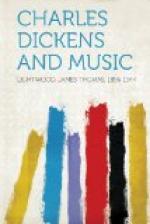And so he does. To hear
him growling away, gradually
lower and lower down, till
he can’t get back again,
is the most delightful thing
in the world.
Of similar calibre is the voice of Captain Helves, already referred to on p. 62.
Topper, who had his eye on one of Scrooge’s niece’s sisters (C.C.),
could growl away in the bass
like a good one, and
never swell the large veins
in his forehead or get
red in the face over it.
Dickens must certainly have had much experience of basses, as he seems to know their habits and eccentricities so thoroughly. In fact it seems to suggest that at some unknown period of his career, hitherto unchronicled by his biographers, he must have been a choirmaster.
He also shows a knowledge of the style of song the basses delighted in
at the harmony meetings in which the collegians at the Marshalsea[18] used to indulge. Occasionally a vocal strain more sonorous than the generality informed the listener that some boastful bass was in blue water or the hunting field, or with the reindeer, or on the mountain, or among the heather, but the Marshal of the Marshalsea knew better, and had got him hard and fast.
We are not told what the duet was that Dickens heard at Vauxhall, but the description is certainly vivid enough:
It was a beautiful duet; first the small gentleman asked a question and then the tall lady answered it; then the small gentleman and the tall lady sang together most melodiously; then the small gentleman went through a little piece of vehemence by himself, and got very tenor indeed, in the excitement of his feelings, to which the tall lady responded in a similar manner; then the small gentleman had a shake or two, after which the tall lady had the same, and then they both merged imperceptibly into the original air.
Our author is quite impartial in his distribution of his voices. In P.P. we read of a boy of fourteen who was a tenor (not the fat boy), while the quality of the female voices is usually left to the imagination.
If Mrs. Plornish (L.D.) is to be believed, her father, Mr. John Edward Nandy, was a remarkable singer. He was
a poor little reedy piping
old gentleman, like a
worn-out bird, who had been
in what he called the
music-binding business.
But Mrs. P. was very proud of her father’s talents, and in response to her invitation, ‘Sing us a song, father,’
Then would he give them Chloe, and if he were in pretty good spirits, Phyllis also—Strephon he had hardly been up to since he went into retirement—and then would Mrs. Plornish declare she did believe there never was such a singer as father, and wipe her eyes.
Old Nandy evidently favoured the eighteenth-century songs, in which the characters here referred to were constantly occurring. At a subsequent period of his history Nandy’s vocal efforts surprised even his daughter.




